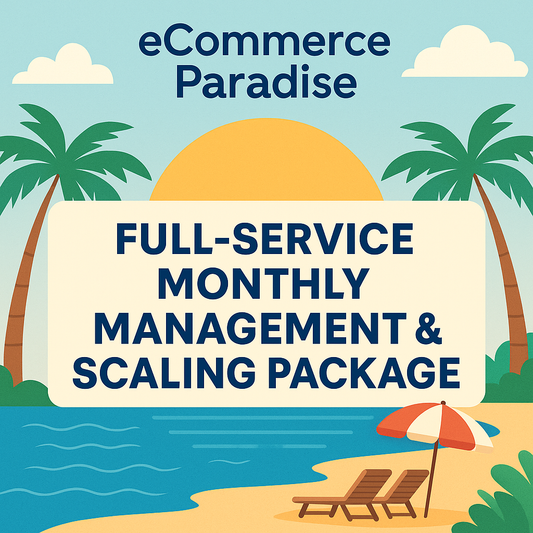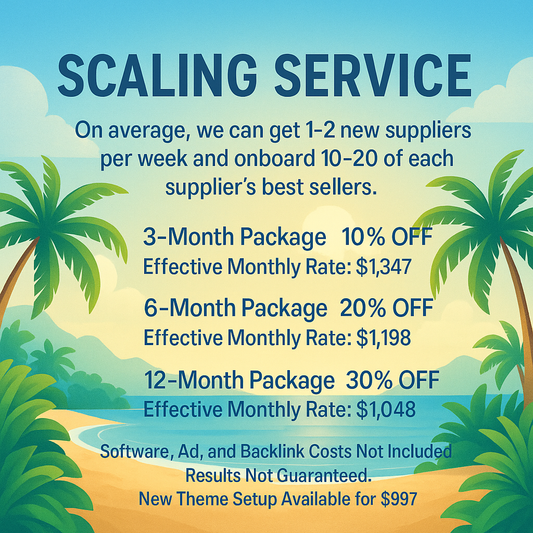
Unlocking SEO Secrets for High-Ticket E-commerce Success
When it comes to diving into the world of high-ticket e-commerce, laying down a solid digital foundation is crucial. As the founder of Ecommerce Paradise, I've seen firsthand how a robust SEO strategy can elevate the visibility of any e-commerce business, particularly when selling premium products. In this article, we’ll explore the essential role that SEO plays in high-ticket e-commerce, especially in the realm of high-ticket drop shipping. So, grab a cup of coffee and let’s get into it!
Understanding the Basics of SEO in E-commerce
Before we delve into the specifics, let’s first clarify what SEO entails. Search Engine Optimization (SEO) refers to the strategies and practices that improve the visibility of your website in search engine results. For an e-commerce site, this means attracting potential customers organically via search engines rather than relying solely on paid advertising methods.
The Importance of SEO for High-Ticket E-commerce
High-ticket e-commerce involves selling products that come with a higher price tag, often requiring a larger investment from your customers. Because these transactions typically require more trust and consideration, your site’s credibility becomes essential. Here’s where SEO shatters expectations and opens doors:
- Increased Visibility: With effective SEO practices, your high-ticket items can rank higher in search results, ensuring more potential customers see your products.
- Enhanced Credibility: Higher search rankings convey trustworthiness and authority in your niche, which is paramount for high-ticket transactions.
- Long-Term Growth: Unlike paid ads that stop once you run out of budget, SEO provides sustainable, long-lasting traffic to your site.
Navigating Keyword Research for High-Ticket E-commerce
Keyword research is a pivotal step in optimizing your e-commerce site for search engines. It entails identifying the phrases and terms your potential customers are searching for. Here’s how to get started:
Identifying Your Target Audience
Understanding your audience is essential in determining which keywords to target. Ask yourself:
- Who is my ideal customer?
- What problems am I solving for them?
- What information do they seek when buying high-ticket items?
Utilizing Keyword Tools
Tools like Google Keyword Planner, SEMrush, and Ahrefs can provide valuable data about search volume and competition levels for various keywords. Focus on long-tail keywords that include phrases such as “high-ticket drop shipping” or “luxury [product] online.” These are less competitive and more targeted, increasing your chances for conversions.
On-Site SEO Strategies for High-Ticket E-commerce
Now that you know the importance of keyword research, it’s time to implement some on-site SEO strategies that can put your high-ticket e-commerce site on the digital map.
Optimizing Product Pages
Your product pages should be optimized with relevant keywords seamlessly integrated into the following elements:
- Page Titles: Include your primary keyword naturally.
- Meta Descriptions: This is your chance to entice users in search results. Briefly describe the product while including your keyword.
- Product Descriptions: Write compelling product descriptions that address customer concerns and motivations while embedding your targeted keywords.
- Image ALT Tags: Don’t underestimate the power of images. Use descriptive ALT tags containing your keywords, helping boost your organic reach.
Creating Useful Content
Content marketing complements SEO beautifully. Start a blog that addresses questions related to your high-ticket products. Aim for posts that educate your audience about their benefits, usage tips, and comparisons. For instance, a blog titled “Why Invest in High-Ticket Drop Shipping?” can draw traffic while enhancing your credibility.
Off-Site SEO Activities
Beyond optimizing your site, building a strong online presence through off-site strategies is imperative for high-ticket e-commerce success.
Building Quality Backlinks
Backlinks are a significant ranking factor; the more reputable sites link back to you, the higher your credibility. Seek out partnerships with bloggers, influencers, and industry publications. Guest posting is a fantastic way to build backlink relationships while reaching larger audiences.
Leveraging Social Media
Social media is more than just a place to showcase your products; it’s an avenue to drive organic traffic and interact with your audience. Share valuable content, engage in discussions, and highlight customer testimonials. Links to your e-commerce store can foster both traffic and backlinks, enhancing your SEO profile.
Technical SEO: The Backbone of Your E-commerce Site
While many focus solely on content, let’s not forget the technical side of SEO. It ensures your e-commerce site is structured appropriately to be indexed and ranked by search engines.
Improve Site Speed
Your website’s loading speed plays a crucial role in SEO. A slow site can deter potential customers, especially in high-ticket e-commerce, where ease of use should be paramount. Consider tools like Google PageSpeed Insights to evaluate your site and make necessary adjustments.
Mobile Optimization
With the rise of mobile commerce, it’s essential that your e-commerce store is mobile-friendly. Responsive design will keep your audience engaged, reduce bounce rates and improve your rankings. Google prioritizes mobile-friendly sites, so ensure that flipping through your online store on handheld devices is an enjoyable experience!
Measuring Your SEO Success
Lastly, to ensure your SEO efforts yield results, you must measure the effectiveness of your strategies.
Utilizing Analytics Tools
Google Analytics and Google Search Console are essential tools for tracking your website’s performance. Monitor metrics such as organic traffic, bounce rate, and conversion rates regularly. This data allows you to understand what’s working and where improvements are needed.
Adapting Based on Insights
SEO is not a one-time endeavor; it’s a continuous journey. Analyze the insights you gather and refine your SEO strategies accordingly. Optimization of your high-ticket e-commerce site should evolve based on customer behavior, industry trends, and technological advancements.
Taking the Leap into High-Ticket E-commerce
Getting into high-ticket e-commerce is an exhilarating venture filled with opportunities. While the competition may be fierce, implementing a solid SEO strategy can set your business apart from the rest. Remember, the goal isn’t just to drive traffic, but to attract the right traffic—those who are eager and willing to invest in your products.
Once you apply these SEO tactics, not only will you see increased visibility, but you’ll also foster trust within your customer base, making it easier for them to consider purchasing those premium items. Dive into the world of high-ticket drop shipping with the knowledge that you have what it takes to succeed!
Ready to elevate your e-commerce journey? Start implementing these strategies today, and watch your high-ticket e-commerce business soar to new heights! Your future customers are waiting!


















